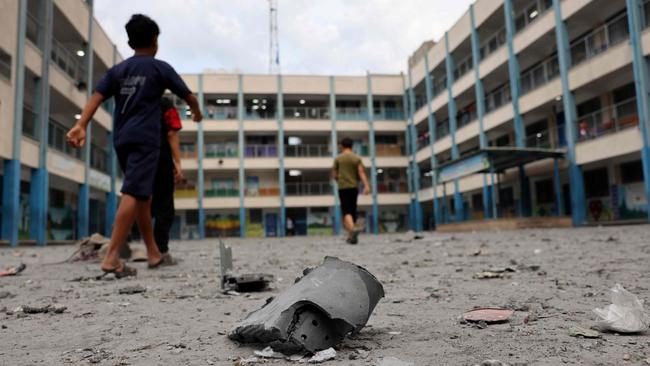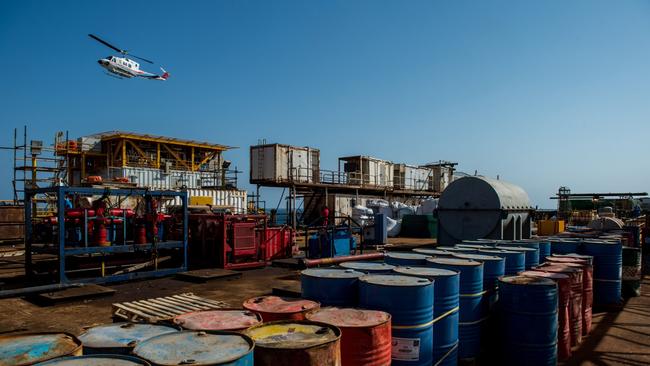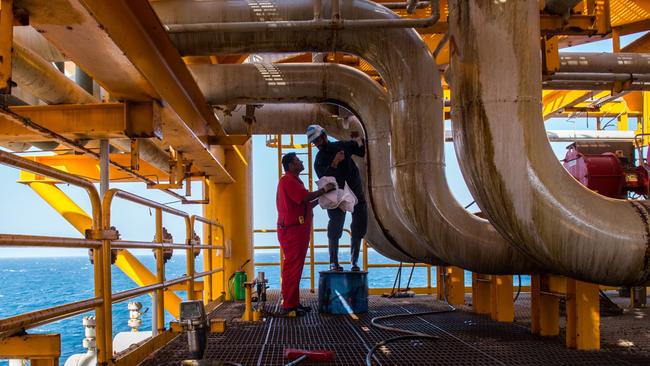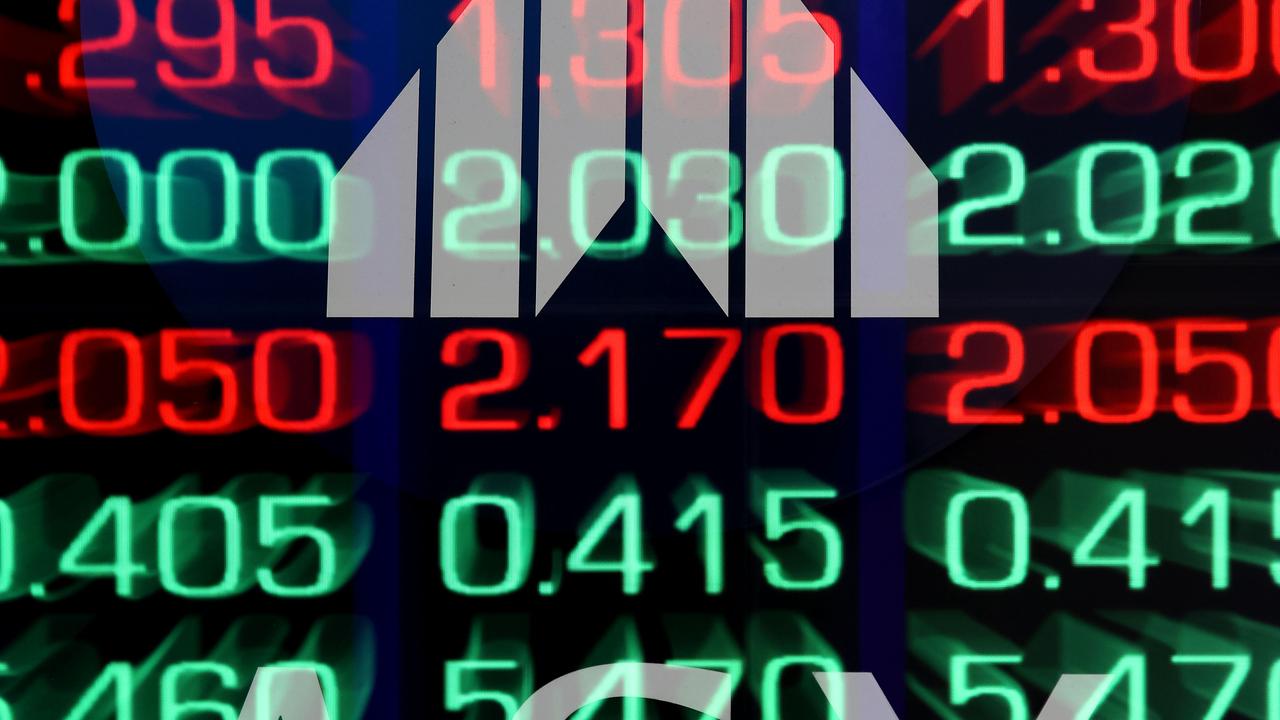Global markets on edge over Middle east strife
Analysts say that the outbreak of war between Israel and Gaza-based Hamas could broaden to affect the oil supplies from Iran.

Risk aversion gripped global markets and investors flocked to safe havens as analysts warned that the outbreak of war between Israel and Hamas could broaden to affect oil supplies from Iran.
After a surprisingly buoyant end to last week in the US as investors focused on some cooler aspects of a much stronger than expected non-farm payrolls report for September, S&P 500 index futures were pointing to a 0.7 per cent fall when trading resumed in New York on Monday.
Australia’s commodity-rich sharemarket rose slightly as oil and gold prices soared in response to the tragic events in the Middle East, the S&P/ASX 200 index ending up 0.2 per cent at 6970.2 points.
Brent crude oil futures were up 3.5 per cent at $US87.55 a barrel after spiking to $US89, gold futures rose more than 1 per cent to $US1865.10 an ounce, the US dollar index rose 0.3 per cent and the US 10-year bond yield slipped to 4.737 per cent, after hitting a 16-year high of 4.89 per cent on Friday.
Australian government bond yields rallied briefly but the dollar fell about 0.5 per cent.

“The situation in Israel shocked the world and with that we saw gold and oil rallying,” said Bell Potter’s head of institutional sales and trading, Richard Coppleson.
It came after Hamas militants killed at least 350 Israelis and abducted dozens more after attacking 22 Israeli towns on Saturday, the worst bloodshed in Israeli territory since Egypt and Syria’s attacks in the Yom Kippur war 50 years ago. In response, Israeli air strikes hit housing blocks, tunnels, a mosque and homes of Hamas officials in Gaza on Sunday, killing more than 400 people, in keeping with Prime Minister Benjamin Netanyahu’s vow of “mighty vengeance”.
Israel was poised to launch a major assault on Gaza to wipe out Hamas, with Mr Netanyahu saying Israel was “at war”, and vowing to pound Hamas “to rubble”.
The potential for Iran’s oil exports to be disrupted by the Israel-Palestine conflict loomed as an immediate concern for the oil market and broader global markets, according to CBA.
With the Wall Street Journal reporting that Iran helped Hamas plan the attack on Israel, according to senior officials from Hamas and Hezbollah, there was downside risks for Iran’s oil supply and exports if Western countries officially linked Iranian intelligence to the attack, said CBA commodity strategist Vivek Dhar.
Deployment of a US aircraft carrier closer to Israel highlighted US concerns that Iran may become more actively involved in the conflict.
Iran’s oil exports have surged this year as the US has overlooked sanctions to ease tensions with Iran unofficially, as the US sought to contain fuel prices. But about 0.5-1 per cent of global oil supply is at risk of being sidelined if the US decided to enforce sanctions against Iran, Mr Dhar warned.

Even a strong circumstantial case that Iran helped plan the Hamas attacks on Israel could lead to the US applying sanctions on Iran’s oil.
With crude markets already looking tight for the December quarter, an immediate reduction in Iran’s oil exports could push Brent futures above the psychological level of $US100 a barrel in the short term.
Iran’s follow-up response to Western sanctions and US military presence would then need to be assessed given Iran’s ability to disrupt global oil markets via its control over the Strait of Hormuz.
“Any hint that Iran is looking to blockade the Strait of Hormuz would immediately sent oil prices surging,” Mr Dhar said.
It would be “challenging” for Saudi Arabia and the UAE to boost oil supply, “alleviating the Arab world’s leverage over global oil supply”, amid the ongoing bombardment of Gaza, he added.
Crestone senior asset allocation specialist Matthew Tan said that while past conflicts within the Gaza Strip between Israel and Hamas had had limited implications for the global economy and markets, the risks of this conflict escalating and expanding were “elevated”.
His concerns were around the scale and unexpected nature of the attacks, the taking of multiple hostages, including Israeli military prisoners, and pre-existing domestic political tensions around Mr Netanyahu’s attempts to change the country’s judicial system.
“Taken together, these domestic political constraints likely tilt risks towards further escalation in the conflict, at least for a time,” Mr Tan said. “The key downside risk for economies and markets is an escalation of the conflict to include other major countries in the Middle East, particularly Iran.”
An Israeli reprisal that brought it into conflict with Iran risks a blockade of the Strait of Hormuz and significant disruption to global oil supplies, putting further upward pressure on oil prices and headline inflation, which would “present challenges for central banks and how they respond”.

“There are further potential flow-on effects – an extended, potentially escalating conflict could put further pressure on Western munitions stockpiles, which are already depleted after 18 months of conflict between Russia and Ukraine,” Mr Tan said. “It would also further occupy US and NATO attention and capacity, reducing the West’s ability to respond to any further crises for example, in the Korean Peninsula.”
He said the two key channels of potential transmission were a spike in oil prices and supply disruption; and significant market volatility and impacts on risk sentiment that flowed to the real economy.
RBC Capital Markets head of global commodity strategy Helima Croft agreed that the situation on the ground in Israel remained “very fluid” following the “unprecedented Hamas attacks”.
Iran remained a “very big wild card” and investors should monitor how strongly Israel blames Tehran for facilitating the attacks by providing Hamas with weapons and logistical support, Ms Croft said.
“We anticipate that Israel will escalate its long-running shadow war against Iran; which has entailed assassinations of nuclear scientists and military commanders, mysterious explosions at key nuclear and weapons facilities, and cyber attacks on critical infrastructure sites,” she said.
Iran’s response to such an intensification was “unpredictable”, and the White House would be under significant pressure to support Israel given the scale of what had transpired, she said.




To join the conversation, please log in. Don't have an account? Register
Join the conversation, you are commenting as Logout